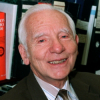Joseph Rotblat

Joseph Rotblat
Sir JosephRotblat KCMG CBE FRSwas a Polish physicist, a self-described "Pole with a British passport". Rotblat was the only physicist to leave the Manhattan Projecton the grounds of conscience. Rotblat's work on nuclear fallout was a major contribution toward the ratification of the 1963 Partial Nuclear Test Ban Treaty. A signatory of the Russell–Einstein Manifesto, he was secretary-general of the Pugwash Conferences on Science and World Affairs from their founding until 1973. He shared, with the Pugwash Conferences, the 1995...
NationalityPolish
ProfessionPhysicist
Date of Birth4 November 1908
CountryPoland
Whatever system of governance is eventually adopted, it is important that it carries the people with it. We need to convey the message that safeguarding our common property, humankind, will require developing in each of us a new loyalty: a loyalty to mankind. It calls for the nurturing of a feeling of belonging to the human race. We have to become world citizens.
Technology is driving us together. In many ways we are becoming like one family. With the global threats resulting from science and technology, the whole of humankind now needs protection. We have to extend our loyalty to the whole of the human race.
The chief task was to stop the arms race before it brought utter disaster. However, after the collapse of communism and the disintegration of the Soviet Union, any rationale for having nuclear weapons disappeared.
Long before the terrifying potential of the arms race was recognized, there was a widespread instinctive abhorrence of nuclear weapons, and a strong desire to get rid of them.
But scientists on both sides of the iron curtain played a very significant role in maintaining the momentum of the nuclear arms race throughout the four decades of the Cold War.
The time has come to formulate guidelines for the ethical conduct of scientist, perhaps in the form of a voluntary Hippocratic Oath.
At this momentous event in my life - the acceptance of the Nobel Peace Prize - I want to speak as a scientist, but also as a human being.
To sum up, there is no evidence that a world without nuclear weapons would be a dangerous world. On the contrary, it would be a safer world, as I will show later.
We have been trying for 40 years to save the world, sometimes against the world's wishes,
who have been trying for 40 years to save the world, sometimes against the world's wishes.
But there are other areas of scientific research that may directly or indirectly lead to harm to society. This calls for constant vigilance.
Several studies, and a number of public statements by senior military and political personalities, testify that - except for disputes between the present nuclear states - all military conflicts, as well as threats to peace, can be dealt with using conventional weapons.
Since the end of the Cold War two main nuclear powers have begun to make big reductions in their nuclear arsenals. Each of them is dismantling about 2,000 nuclear warheads a year.
Then, we were told that a world war was prevented by the existence of nuclear weapons. Now, we are told that nuclear weapons prevent all kinds of war.